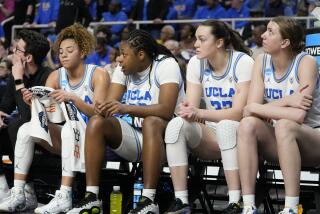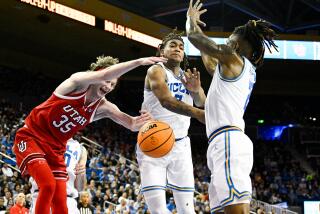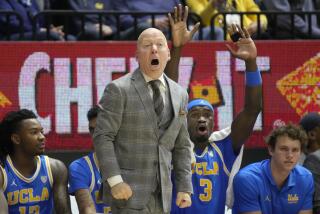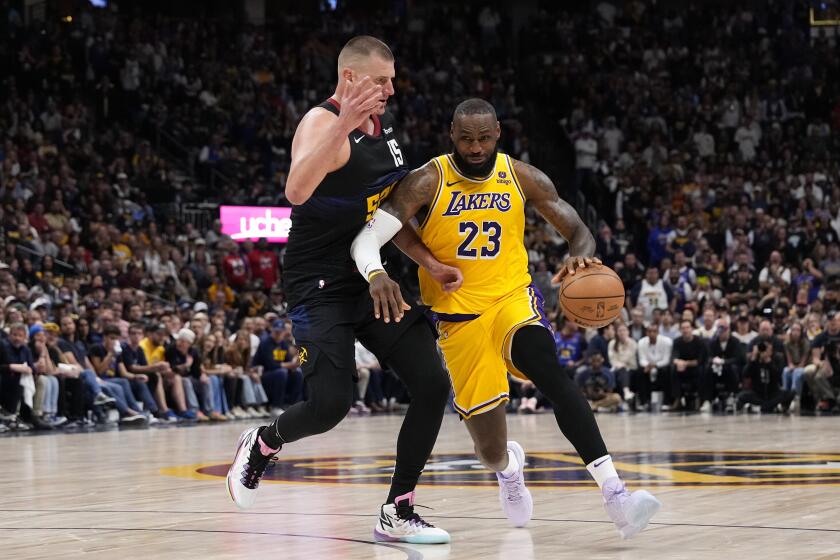Ebola chased Mohammed Kamara out of Africa and onto UCLA’s soccer team
Three defenders in white jerseys gave chase, but none could catch Mohammed Kamara as he sprinted toward the goal.
Most of his UCLA teammates were still behind the midfield line when he tore into shooting range. The goalkeeper chose to step out and meet Kamara, an immediately regrettable decision.
With a flick of his right foot, Kamara lifted the ball high above the goalie’s head, where it floated for a couple of seconds before falling halfway into the goal box, taking a giant bounce, and settling into the back of the net.
Kamara’s first goal for the UCLA men’s soccer team, which sparked a 4-0 season-opening win over Coastal Carolina on Aug. 24, earned the No. 2 spot on SportsCenter’s top 10 plays that day.
“You really see so much in that goal — his confidence, his ability, his thought process,” UCLA coach Jorge Salcedo said. “I mean, very, very few people can score a goal like that.”
Kamara leads UCLA with four goals as the Bruins have opened with four victories in five games,an encouraging start for the team regrouping after a one-year fall from greatness. After 34 years as one of the nation’s top soccer programs, with four national titles and nine Final Four appearances in that span, UCLA last season failed to reach the postseason for the first time since 1982.
Kamara understands what a lost year feels like. He had his soccer prowess stripped away in one year, and has been fighting back ever since. Pursuing a career in soccer brought him from Liberia to Tyler Junior College in Texas, and what drew him to UCLA.
Kamara’s path toward professional soccer seemed on track when he graduated high school in July 2014. But by then, an epidemic had emerged in West Africa, threatening his future and his country’s — the deadly Ebola virus.
Ebola spreads through close contact and bodily fluids, so his family set rules to stay inside. Kamara stopped playing competitive soccer, since his father feared it could expose his son to the virus.
Kamara would still sneak away to play with friends, until the death toll started climbing, from 88 people as of July 14, 2014 to 2,812 by Nov. 14. The government put part of Kamara’s hometown, Monrovia, under quarantine Aug. 19. By the time the quarantine expanded to Kamara’s neighborhood in 2015, he was already spending entire days indoors.
For a year, Kamara barely left the house. He watched movies with his six siblings and played games his mother invented while Ebola wreaked havoc outside. By Jan. 14, 2016, when Liberia was declared free of the virus, 4,809 people had died.
You really see so much in that goal — his confidence, his ability, his thought process. I mean, very, very few people can score a goal like that.
— UCLA coach Jorge Salcedo
It took four to five months after the quarantine ended for neighbors still fearful of the virus to resume normal activities. And when Kamara finally set foot on the field again, he found his skills dramatically eroded. Reflexive movements felt foreign, but at least he was finally outside.
“It was like being free again,” Kamara said, “or almost like being born again. …”
His father set up cones for field drills, and Kamara worked to reclaim lost muscle memories.
But he was running in place. In Liberia, wealthy individuals who are well-connected in the soccer world sponsor youth athletes, and Kamara was offered a deal when he was 16. The sponsor would have bought Kamara’s gear and used connections to help him reach the national team. However, there was a catch: If he signed, Kamara would lose the right to choose when and where he played; that became his sponsor’s decision.
“The person basically has rights to you now,” Kamara said.
His father refused to let Kamara sign, and it proved costly. Two days before the national team showcase, Kamara’s name disappeared from the invitation list. He saw friends who signed sponsorship deals advance as his chances slipped away.
There was another option, but Kamara had dismissed it — until one night when his father pulled him in for a man-to-man talk.
“Everyone knows you’re better than them, but see what’s happening now?” Kamara remembers his father saying. “These guys are going at a higher level and you keep, like … you’re just here. And is this what you really want? Or do you want to be in a place where you get recognized for what you can do?”
It was like being free again or almost like being born again. …
— UCLA soccer player Mohammed Kamara
The option was heading to the United States. Kamara had been getting emails from a Tyler Junior College assistant coach, Kyle Timm.
Timm, who is from South Africa and played professionally, heard about Kamara from a former teammate from West Africa. The coach had tried recruiting Liberian players, but they had all chosen to play professionally.
Kamara didn’t have a pro offer, so he accepted Timm’s.
Late joining the Tyler team, Kamara boarded a bus with relative strangers for a two-game trip the day after he checked into his dorm room.
He scored three goals that weekend, but didn’t know his teammates’ names.
“It almost seemed effortless, from our side, just watching him in action,” Tyler coach Steve Clements said. “He really handled it well.”
Kamara scored 22 goals as a freshman and a school record 48 as a sophomore, helping Tyler to consecutive junior college national championships.
UCLA doesn’t typically recruit many junior college players — the Bruins have only two JC transfers on their roster — but Salcedo made an exception for Kamara.
“He told me, ‘Yo, I think you can be the guy to lead this program,’” Kamara said, widening his eyes to mimic his surprise.
Now Kamara is focused on helping restore UCLA to prominence, like he bolstered his career after a setback.
“I want to be the guy at least to help in the process of taking this program back to where it belongs,” Kamara said. “So that’s the challenge I’m really looking forward to, and that’s what got me here.”
More to Read
Get our high school sports newsletter
Prep Rally is devoted to the SoCal high school sports experience, bringing you scores, stories and a behind-the-scenes look at what makes prep sports so popular.
You may occasionally receive promotional content from the Los Angeles Times.






